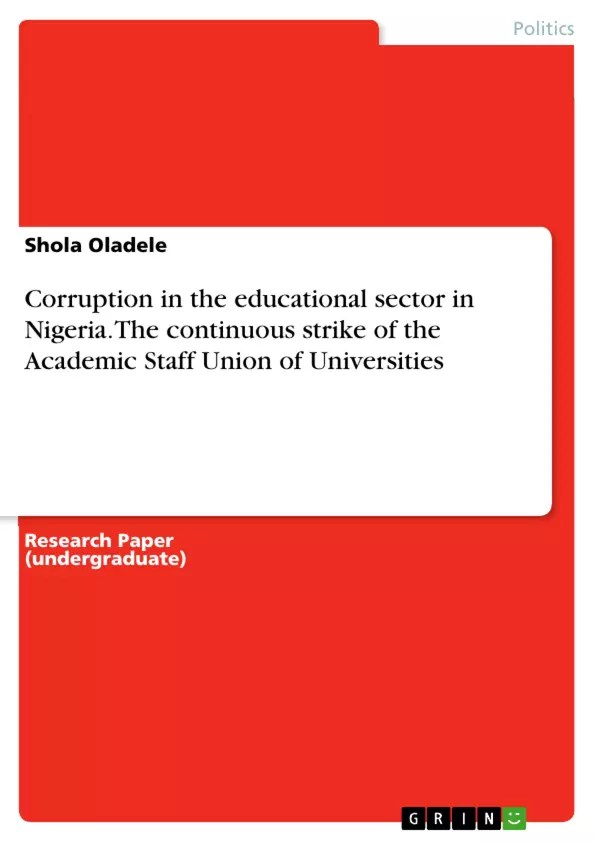This study examines the nature and effect of corruption regarding the continual strike of the Academic Staff Union of Universities (ASUU) in Nigeria.
In order to guide this study, the author focuses on four research questions and a research hypothesis. A standard question was used as the major instrument for data collection from 100 officials of the three labour unions, ASUU, NASU and SSANU of Obafemi Awolowo University. These three groups are the main actors in industrial relations within the university system. 35 ASUU officials, 35 SSANU officials and 30 NASU officials were randomly selected using a random sampling technique.
The study concluded with a recommendation that the government should increase allocation to the Nigerian education sector in order to ensure the country’s education standard. Furthermore, the government should create a forum where prominent stakeholders of the two factions can meet continually to discuss matters of concern.
Regardless of the numerous advantages of university education in Nigeria, the educational sector still faces numerous challenges. Corruption is one of the major factors that have deterred the Nigerian educational sector from achieving optimum results and meeting up the requirements of the 21st century. It has led to an unprecedented level of industrial unrest and many official assaults.
Inhaltsverzeichnis (Table of Contents)
- CHAPTER ONE: INTRODUCTION
- Background to the Study
- Statement of the Research Problem
- Research Questions
- Research Objectives
- Research Hypothesis
- Scope of Study
- Significance of the Study
- Limitation of the Study
- Definition of Terms
- Organization of the Study
- References
- CHAPTER TWO: LITERATURE REVIEW
- Conceptual Review
- Corruption in Nigeria
- Strike in Nigeria Institution of Higher Learning
- Theoretical Review
- Empirical Review
- Gaps in Literature
- References
- CHAPTER THREE: METHODOLOGY
- Research design
- Study Population
- Sampling Techniques and Sampling Size
- Research Instrument
- Reliability and Validity of Research Instrument
- Research Procedures
- Method of Data Analysis and Statistical Tool
- Conclusion
- CHAPTER FOUR: DATA ANALYSIS AND INTERPRETATION OF RESULTS
- Preliminary analysis
- Frequency Distribution of Respondents Background Information
- Frequency Distribution of Respondents' View about Causes of ASUU Strike, Nature of Corruption in Higher Institutions and Incidence of Strike
- Cross Tabulation
- Estimation
- Discussion of Findings
Frequently Asked Questions
What is the main cause of the continuous ASUU strikes in Nigeria?
The study identifies corruption within the educational sector and industrial unrest as major factors leading to the persistent strikes by the Academic Staff Union of Universities (ASUU).
Which labor unions were included in this research?
The study collected data from officials of three major unions at Obafemi Awolowo University: ASUU, NASU (Non-Academic Staff Union), and SSANU (Senior Staff Association of Nigerian Universities).
How does corruption affect Nigerian higher education?
Corruption deters the sector from achieving optimum results, leads to industrial unrest, and prevents the system from meeting 21st-century educational standards.
What are the recommendations for the Nigerian government?
The author recommends increasing budget allocations to the education sector and creating a continuous forum for stakeholders to discuss and resolve concerns.
What was the sample size of the study?
The study surveyed 100 officials: 35 from ASUU, 35 from SSANU, and 30 from NASU, using a random sampling technique.
- Citation du texte
- Shola Oladele (Auteur), 2019, Corruption in the educational sector in Nigeria. The continuous strike of the Academic Staff Union of Universities, Munich, GRIN Verlag, https://www.grin.com/document/488881



